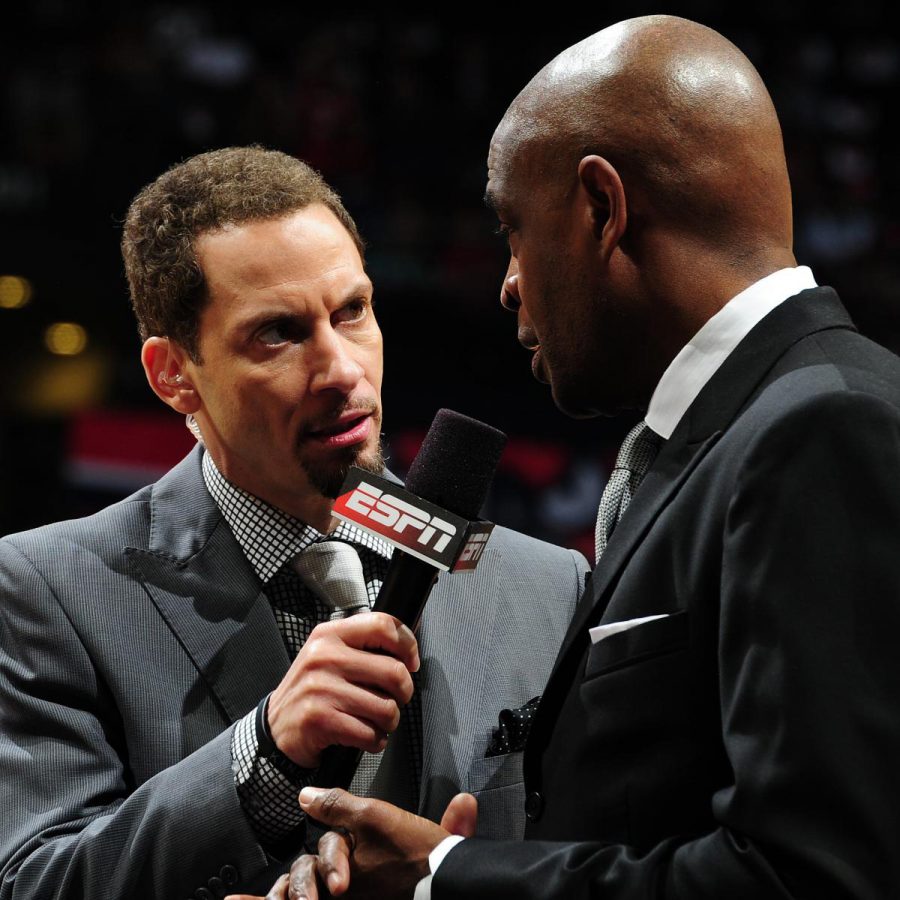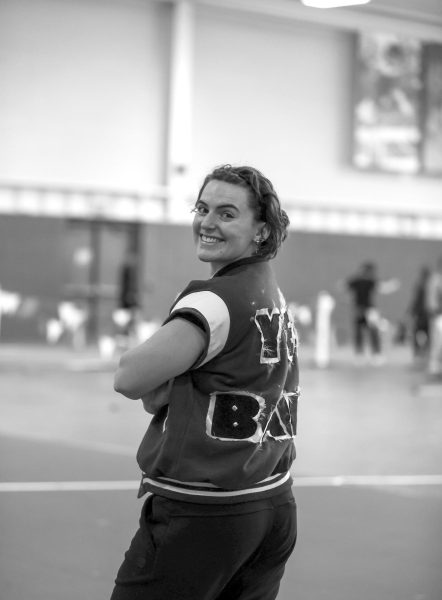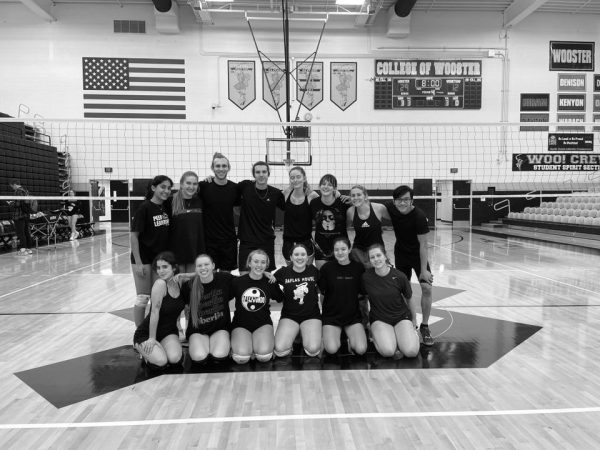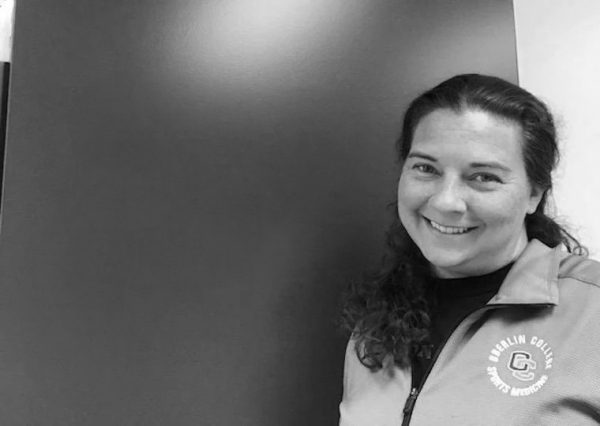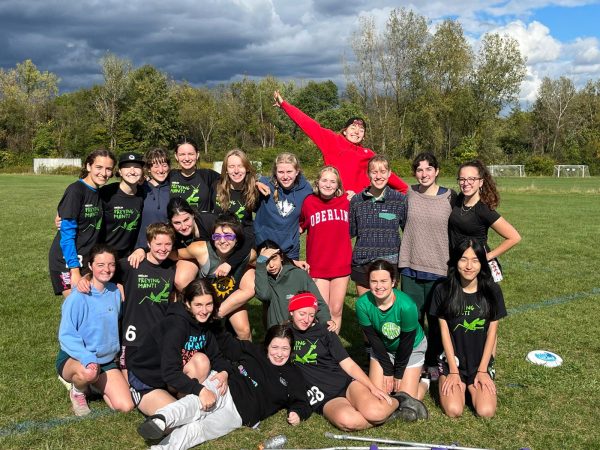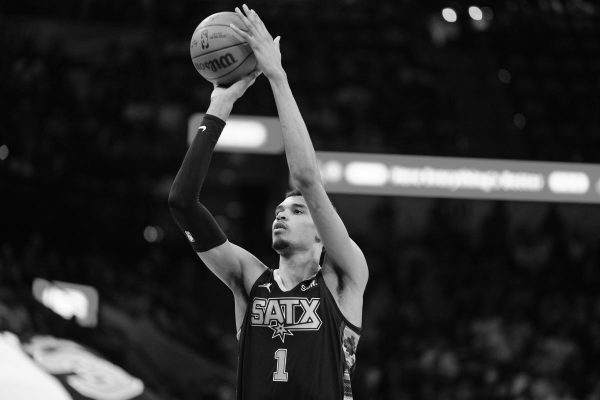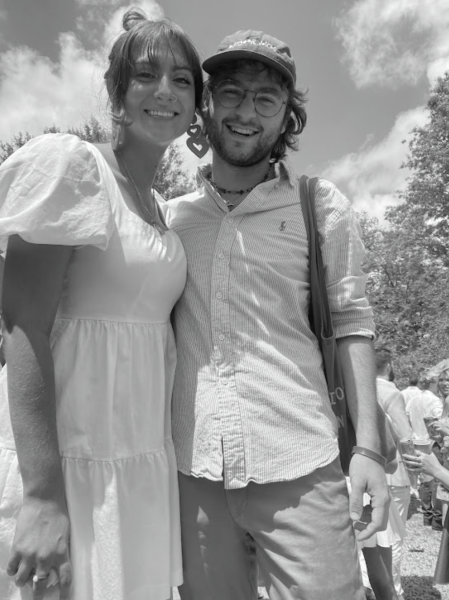In The Locker Room with Chris Broussard, Sports Analyst and Oberlin Varsity Basketball Alum
Photo courtesy of Chris Broussard
Chris Broussard
When Chris Broussard, OC ’90, began his journey as an Oberlin College student-athlete in 1987, he didn’t know what he wanted to study or do for a living. He was only sure of two things: He loved writing, and he loved the game of basketball. After graduating with a bachelor’s degree in English, Broussard went on to write for several publications, including The Plain Dealer, the Akron Beacon Journal, The New York Times, ESPN The Magazine, and ESPN.com. He now covers the NBA as a sports analyst for Fox Sports and regularly appears on FS1’s Skip and Shannon: Undisputed, where he debates happenings in the sports world with commentators Skip Bayless and Shannon Sharpe.
This interview has been edited for length and clarity.
Aside from basketball, what were you involved in on campus? What do you remember most about your time as a student-athlete?
While I was at Oberlin, I was a writing tutor and I wrote for the Review sparingly. I was never on staff, but I probably wrote about four or five articles, all of which I believe were [about] the basketball team — and since I played on the basketball team, I had to use a pen name. I was also on a ton of school-wide committees that helped make student and administrative decisions about the College. I was a DJ at WOBC, I had a hip-hop radio show for my second, third, and fourth years called Bring The House, and I DJed every Saturday night from 8–11 p.m. I used to DJ at the ’Sco and at house parties a lot, too, and during my senior year, my friends and I hosted a campus-wide lip sync competition. It had been a tradition for years at Oberlin, but nobody put it together my junior year, so senior year my friends and I held it down!
Did you always know you wanted to be a professional sports correspondent? How did your Oberlin experience lead to that career?
When I got to Oberlin, I really didn’t know I’d end up on the career path I got to. I started as an Economics major, because I didn’t know what I wanted to do and my father worked in business, so I figured, “Hey, I’ll try business just like my dad.” So I took Intro to Economics my [first] year, and that was the end of that. I did pass, but barely.
So my sophomore year, I began looking around at my friends [and] teammates and [realized] that they all seemed to know what they wanted to do. Some were going to medical school, some grad school in public policy or law school. One friend was in the engineering program. Everywhere I looked, people seemed to know what they wanted to do with their future, and I really didn’t have a clue. Only two years left to figure out what to do before I’m a responsible adult — so I got scared.
But I came up with a formula: something I enjoyed plus something I was gifted at. I enjoyed sports, obviously, and I was always gifted at writing — I used to work as a writing tutor and also rap at a lot of shows at Oberlin, so I landed on sports writing and thought, “Let me try this.” My grades were good, so I landed a summer internship at The Plain Dealer in Cleveland after my junior year, and they really just took a chance on me. They gave me a shot regardless of my lack of experience, and that’s really how everything started for me in journalism. And that’s one way Oberlin really came through for me — being on all those committees, having all those leadership positions really helped enhance my people skills and helped me do well in those interviews and the rest of my journalism career.
Why did you decide to switch to broadcast journalism after years of experience in print?
When I was leaving Oberlin, I had to make a decision to pursue print or broadcast journalism, and the experience and opportunities I had were in print, so I chose print and fortunately did well. The way I morphed into a broadcaster was after working for some time at the Indianapolis Star, [Cleveland’s The] Plain Dealer,and [The] New York Times, when I started getting some TV opportunities. The opportunities were local at first, but then ESPN caught on, and in 2004, I was invited to write for ESPN The Magazine. It was specifically a writing contract, but it included a little bit of TV appearances.
At that point, I wasn’t really thinking about making a career out of broadcasting, but at ESPN, I started getting on TV more and more, mostly due to the information I had about the [NBA]. And if you were comfortable in front of the camera and had charisma, you started to morph into more of a TV personality. So the more TV appearances I made, the less writing I did, because time and location conflicts became more of a problem, and by the time I left ESPN in 2016, I was doing a little bit of writing, but my main focus was on TV and radio. Fox offered me the opportunity to be an analyst and a commentator, which appealed more to me than chasing the news, which is what I had been doing. So I went from being essentially a beat broadcaster at ESPN to a columnist at Fox News. Now I get to give my opinions, analyze games and players, and I haven’t written a word since 2016. I also get on the radio now. I have a daily show called The Odd Couple with Rob Parker, and we’re on over 320 stations around the country.
Is there anything you miss about print journalism?
Honestly, I don’t really miss print. It was fun and great for me, though. I really enjoyed it. I was able to cover historic events in the MLB, NBA, and NFL. I reported at Michael Jordan’s last game, at LeBron James’ first game, and I was there when LeBron brought Cleveland its first championship in 52 years. The best part of my print journalism career was writing for ESPN The Magazine, because that lifestyle was best suited for a family. When I was a beat writer, I was traveling all the time, and that was tough on my family, but when I wrote for the magazine it was leisurely. I wrote an article maybe once every two or three months, but you work on that article all the time. I was also able to travel all the time. I went to various parts of Africa, Europe, Kuwait, Paris, Rome, Spain. It was great.
One thing I did really like about print journalism was that it helped me stay in touch with my college friends. As a beat writer, I was traveling around the country, and everywhere I went, I had a different Oberlin friend to see and stay with. It definitely helped me stay close to my college friends after graduating. So that was really fun.
What is your favorite part of your current job? What is the most rewarding?
Today, radio is a lot of fun. TV is fun as well, but when you’re on the radio you have more room to expand on your point. On TV, you have to make your point a lot more quickly, and your speaking time is limited. On the radio, my show is two hours long, so we get a lot of time to expand on our thoughts. My favorite thing about the job now is that I get to really let my personality come out. On ESPN, people definitely caught a glimpse of my personality, but as a reporter, your personality can’t always shine through, because you have to be giving out information. Now, I’m able to showcase my personality and share some of my own views on various topics in the world of sports.
What is something most people probably don’t know about your current job?
We wear makeup! I don’t know if this will exactly answer your question, but 30 years ago, before the internet and all that, no one knew it would be possible to do all these jobs that we do now. Thirty years ago, you didn’t have national sports talk radio shows. You didn’t have daily debate shows like Undisputed or First Take on ESPN. In the ’90s, local sports talk shows were emerging, and eventually so were all sports talk radio stations, but they were local, and the reason you couldn’t have the types of shows I’m on now is because the technology to keep up with all the information out there just didn’t exist. You couldn’t read about all the teams you wanted to in every newspaper throughout the country. You kind of just had to cover your local team. The profession of a sports reporter obviously existed before me, but we’ve helped it take form as we’ve worked though it.
In addition to those things, you read — a lot. You just have to read so much stuff about different teams and leagues. That’s really what enables you to do this job. There are a ton of college kids now that want to be in this field. They want to get up there and give their opinions, but most of the guys who are giving the opinions all had long careers as reporters and established their credibility. Anybody can have an opinion, but you need to have the credibility for people to care about your opinion. And that usually happens by being a reporter, having your own radio show, and reading — really developing your own craft and your own voice before you get thrown on First Take.
What is one goal you have for the rest of your career before you retire, whenever that may be? What’s left on your career bucket list?
Well, I’ve obviously got things on my personal bucket list, but my career bucket list … I’ve never really thought about that. I did do something different for me this year that counts for my career bucket list. Before this year, I had covered the World Series and the NBA finals, I’d been to the all-star games in both leagues, I’d been to NCAA basketball tournaments and boxing matches, but one thing I had not covered was the Super Bowl. This year, I did my radio show from the Super Bowl in Atlanta all week. That was great and fun, and now I can say I worked a World Series, an NBA Finals, and a Super Bowl!
I guess the next thing on the horizon for me would be a television show. It’s not that I think if I don’t get one I’ll be unfulfilled. I’m definitely happy where I’m at, but that makes sense as the next thing I would do. I’m a guest and analyst on a bunch of shows right now, but I don’t have my own.
But when I think about my career — look, I’ve interviewed Michael Jordan, Magic Johnson, LeBron James, every great basketball player you could name of the last 40–50 years, I’ve interviewed and talked to. In any career, a lot of times you get to a place where you’re not going to go any higher. And that’s not a bad thing, but at some point, everybody’s not gonna be the president, CEO, etc., so I’m pretty content where I’m at.


